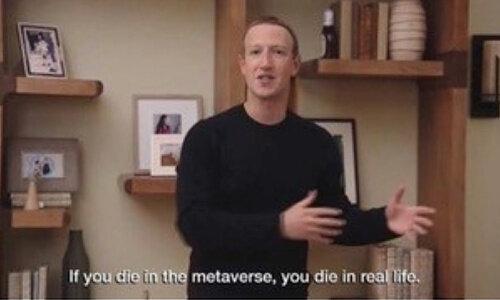Martha Boeckenfeld: «Metaverse Or The World Is Not Enough»
Do you want to live on Earth, Mars or in the Metaverse? With Elon Musk wanting to reach Mars with SpaceX so humanity is not a single planet species, the Metaverse is getting traction «beyond» META, Martha Boeckenfeld writes in an essay on finews.asia.
The metaverse is the bridge to the unseen world. It allows people to directly communicate and visualize things that were previously very difficult, such as their imagination. There will be many individual metaverses as well as platforms for building metaverses like the meta metaverse which will also require languages for describing metaverse specific transformations. Other specialized metaverse browsers will be needed to show the way forward. «The world will never look the same,» Joel Dietz, a cyberfuturist, artist and entrepreneur, concludes.
Recently, there have been early indications of the potential size of the metaverse economy, with parcels of virtual land inside crypto-based metaverses Decentraland and Axie Infinity selling for more than $2 million. The metaverse refers to a range of online 3D virtual environments, in which people can play games, build things, socialize, work and even trade and earn crypto assets.
In Its Early Innings
The most well-known individual metaverses right now are in gaming, with Fortnite and Roblox booming in popularity over the last few years. Grayscale estimated that revenue from virtual gaming worlds could grow to $400 billion in 2025, from around $180 billion in 2020.
Yet Grayscale, which runs the world's biggest cryptocurrency fund, said the metaverse is still «in its early innings.» It said Facebook's plans to spend $10 billion this year on the metaverse is a sign of the potential of the market. The market opportunity for bringing the Metaverse to life may be worth over $1 trillion in annual revenue. Many current metaverse projects, such as virtual realities or games, are run by so-called Web2 companies, which are centralized and operate for profit. Facebook as an example, has launched the virtual reality space with Horizon Worlds.
But increasingly, metaverse projects are created on or are heavily tied to crypto technology, which can give users more control and allow them to earn money that they can use in the real world. This is known as the Web3 metaverse.
Love, Play and Work in the Metaverse?
The opportunities for living and earning within the Web3 metaverse include art galleries launching NFTs, games and casinos where players win crypto, digital advertising billboards, and music venues where DJs and artists hold concerts. The first big splash was made in art: In recent months the first digital-only auction by Christie's rewarded USD 69m for the artist Beeple.
Among the companies that are already first comers in this new economy are a gaming company, namely Epic with its Fortnite game. The game hosted Travis Scott and Ariana Grande by creating a convincing, realistic world around the game. We explored already working virtually and in some instances with and as Avatars. The metaverse will also allow more interactive in-store experiences. VR and AR sets will make it possible to try a variety of products within the store if the product is in store or not.
Play to Earn
The ability to earn by playing a game has transformed the lives of some players, many in the Philippines where it exploded in popularity as the pandemic locked many out of work, and dollars — as well as digital tokens – go far. At least when their prices are up.
It’s impossible to say exactly how many people are playing to earn. But all the signs are pointing up. As of last March, about 51,000 daily active wallets were connected to gaming-related contracts in the blockchain ecosystem, according to DappRadar, a firm that tracks data on decentralized finance. Three months later, that figure had skyrocketed to 359,284 – a 599 percent increase.
Games like Axie show why tech titans are gravitating toward the concept: The metaverse and its possibilities have the potential to upend not just how we work, earn and spend, but also the fundamental ways in which we live, plan and run our lives. In essence, they promise to transform the way capitalism works.
Axie embodies a new generation of games, where game creators are not operating from a place of fear but rather as an open, free-market economy... «What this means for the future of games, and really the web as we know it is as big as your imagination will allow,» Arianna Simpson, general partner at venture capital firm Andreessen Horowitz that has invested in Sky Mavis, the Vietnamese studio that developed Axie.
In the third quarter, total Web3 and NFT fundraising hit $1.8 billion, out of overall crypto fundraising of $8.2 billion, Grayscale reported.
Buy, Rent, Sell to Earn
One of the first companies to get into the real estate business is Metaverse Group, which operates a virtual world called Decentraland. Recently, Metaverse Group’s parent company, Token.com, announced that a «116 parcel estate in the heart of the Fashion Street district within Decentraland» sold for the equivalent of about $2.5 million. The new owner of this estate near Fashion Street could presumably profit if Louis Vuitton wants to open a store there. This Decentraland deal did not involve real money-the digital estate sold for 618,000 MANA, a type of cryptocurrency used in Decentraland.
«Imagine if you came to New York when it was farmland, and you had the option to get a block of SoHo,» Metaverse Group co-founder Michael Gord recently told the «New York Times». «If someone wants to buy a block of real estate in SoHo today, it’s priceless, it’s not on the market. That same experience is going to happen in the metaverse,» Gord added.
With Smart Contracts
In that metaverse, people log in to play games, earn the native cryptocurrency MANA, purchase NFTs including virtual land and collectibles, and vote on the governance of the economy. What makes the metaverse real estate boom all the more enticing, though, is the idea that once you own a piece of digital land, you might be able to make money by leasing it out or selling ads. With smart contracts, even mortgages play a role.
In addition to Decentraland, you can now buy digital land in metaverses with names like Somnium Space, the Sandbox, and Upland. Last week alone, more than $100 million worth of metaverse land was sold as NFTs in metaverses including the sandbox (SAND), decentraland (MANA), CryptoVoxels, and Somnium Space, according to DappRadar.
Mixed Reality Glasses Expected
One company called Spotselfie, which currently operates an augmented reality app, will soon let you buy virtual real estate that’s associated with GPS coordinates in the real world through a new feature called Spotland. The idea is that by using tokens issued by Spotselfie – these are effectively cryptocurrency that’s specific to this metaverse, much like the MANA used in Decentraland – you’ll buy the rights to a radius around a GPS coordinate, and then if Spotselfie decides to sell ads at that location, you get a cut. The big difference here is that Spotselfie’s metaverse is designed for augmented reality, not virtual reality. To see the metaverse, you just point your phone’s camera at the real-world location, and the Spotland software overlays a digital world onto your screen, ads and all.
If and when mixed reality glasses become a thing – some analysts predicted that Apple will release a version of them in 2022 – we could be walking around looking at an overwhelming collision of real and digital worlds. It’s unclear exactly who will own that space. Spotselfie co-founder Ray Shingler, for one, hopes that by offering users the option to buy now, his technology will bring some of that democratic, web 1.0 spirit to the nascent metaverse.
«I’m trying to figure out a way,» Shingler told Recode, «where the users are actually getting something out of being in the app, and they actually control the metaverse. Because if you don’t control it soon enough, it’ll be lost to Facebook...»
Who Owns the Metaverse?
In principle, the metaverse concept is not that different from the early days of the web. Starting in the late 1980s, a common programming language for the web (HTML) enabled people to build websites that hosted content or offered services to users, and eventually, when websites attracted enough of these users, the site owners could sell ads or charge fees to make money off it all. The big difference, of course, is that the web was designed to be free while the metaverse seems destined to be owned by big companies.
A new iteration of the internet is being worked on and this will have massive implications for society. We will face new challenges but also new opportunities. This new era of the metaverse will unleash amazing creativity and open up new frontiers and horizons for brands and businesses and human beings- a lot of questions to be answered- who controls and are we able to democratize the metaverse to live a better life?
Elon Musk tweeted this picture (see below) after Marc Zuckerberg announced the new updates of Facebook, now called META.

«I guess we will find out soon enough. Let's meet up in ten years in the online space and have a big cyber party. See you then. #elljoworld,» Musk wrote.
Now the question is, how are you getting ready and where do you want to live?
Martha Boeckenfeld, a Swiss-German dual citizen and lawyer, is a senior advisor for digital platforms and ecosystems. In this role, she is also on the Executive Committee of the Switzerland region. She earned her doctorate in Münster and then held senior positions at Winterthur Group, which at the time was part of Credit Suisse. She also served as an Executive on the Group's Board of Directors. She is distinguished by her more than 20 years of experience in management positions in the financial services sector, most recently as Chief Financial Officer of BHF Kleinwort Benson Group and as CEO of Kleinwort Benson Bank.
This article was first published on Martha Boeckenfeld's LinkedIn account.




















